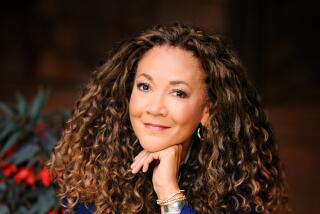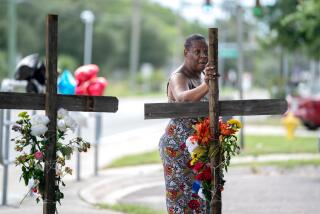A FORUM FOR COMMUNITY ISSUES : Community Essay : ‘Racism Rears Its Hateful Head in Kindergarten’ : Prejudice: Somehow, parents of the generation that should achieve equality are teaching 5-year-olds a basis for hate.
- Share via
My little girl took to kindergarten, as they say, like a fish to water. Her first day of school was more wrenching for me. I dreaded the cruelty of other children, mourned her lost innocence, feared the challenge of her bringing home the phrase, “But my teacher says . . . “ But I walked with her through the front double doors, down the school-smelling corridor, into the brightly ordered classroom and let the next chapter write itself.
All afternoon I watched the clock. I pictured my daughter easing her way into the world of group dynamics. I hoped she was enjoying her day with all her heart. The thought that she might be missing me was too painful to contemplate. To my delight, when I picked her up she was still herself, and eager to return the next day.
My husband the teacher warned me to expect some behavioral changes along with the exuberant art now crowding our refrigerator gallery. I knew she would try on the different mannerisms and vocabulary that she observed or admired in her new friends. It’s genetic: I acquire a drawl whenever we visit my husband’s Texas relatives, and still I sometimes smile without showing my teeth, like my high school idol. So I took in stride her sudden consuming interest in TV Ninja Turtles, and her new-found hilarity with words denoting bodily functions. She was particularly taken with a boy named Timothy, the class cut-up whose antics she related to us nightly at the dinner table. There was no end to his audacious capacity to provoke laughter and mayhem. She seemed genuinely fond of Timothy, and my husband and I privately joked about her future dates showing up in leather jackets and skull tattoos.
I could handle tattoos. I could handle leather. I thought I could handle all of it easily. Then she stopped talking about Timothy. After a few days of uncharacteristic silence, she confided to me in a quiet, troubled, somehow older voice that several of her new girlfriends had assured her that “a white girl can’t marry a black boy.” This change in my daughter shocked me like ice on sunburn, like a hard slap in my face. Timothy is black, my daughter white. Their friendship, in her mind, was endangered. And forever altered.
It occurs to me, as I sort this out, that while I have been carefully, lovingly nurturing my little ones, cocooning them perhaps too much, the years of Reagan/Bush have taken their toll on the outside in many small ways. I assumed that 5-year-olds naturally see themselves as equals, that they have not yet begun to categorize and prejudge. It seems I have been naive.
In America we say we want our children to have faith in a loving God, to treasure liberty and equality, to care for their fellow humans and the Earth they inhabit. This is what our lips say. But when racism rears its hateful head in our kindergarten classrooms, I must wonder what our hearts say, what our actions say. Where, if not at home, do our youngsters learn to state with stark certainty that “white girls can’t marry black boys”?
When I was a teen-ager growing up in New England, I told my parents about a friend I had met. He was pre-med at Brown University--an American dream for parents. They encouraged me to invite him to spend a weekend in our home as a sort of get-acquainted visit. Plans proceeded swimmingly until I showed them a photo. He was black. And my parents retreated hastily from the whole idea. I suppose that photo was their slap in the face. I suppose, in retrospect, that I intended it that way.
Invite him for the day, my mother suggested, her eyes a veil. I remember being very angry with their hypocrisy and prejudice, with their wanting to protect their sheets and towels (not to mention their daughter) from exposure to a black man. I never did invite him because I knew they would somehow let their fear and narrow-mindedness slip out and embarrass me horribly. Our relationship was doomed to the mail, and I can’t remember now who finally had time to write the last letter.
Eventually I forgave my parents for beliefs that they never thought of as wrong. But I fervently believed in the future. I never questioned that by the time my generation had children, blatant racism would be as dated as slavery. The civil rights movement was too powerful to be ignored, and those of us who knew all the verses to “We Shall Overcome” were too enlightened to turn back the clock. And although I read in the paper about civil rights setbacks in the new Supreme Court, and places like Florence and Normandie, I guess in my heart I still believed.
I was slow to grasp that as soon as you take an idea or a principle for granted, as soon as you stop rigorously affirming your belief, it will fade away. Peace and equality are not automatic, as I once thought, but rather ideals that must daily thrive in our hearts and in our homes, even as we nurse and rock our newborns. I am frustrated that we have to re-teach what I thought was gospel. But we cannot yearn for peace and justice while we pass on ignorance and prejudice. We owe so much more to our children, because we know better. I feel foolish for my years of complacency.
So I tell my little girl that a white girl can marry whomever she loves, or nobody at all, and so can a black boy, and so can anyone else in our noble country. I also tell her that these decisions can wait awhile, and that she can always be Timothy’s friend. Her relief is palpable, and I vow to work to make it all somehow come true for her. I don’t quite know where to start.
But deep in my heart, I do believe.






